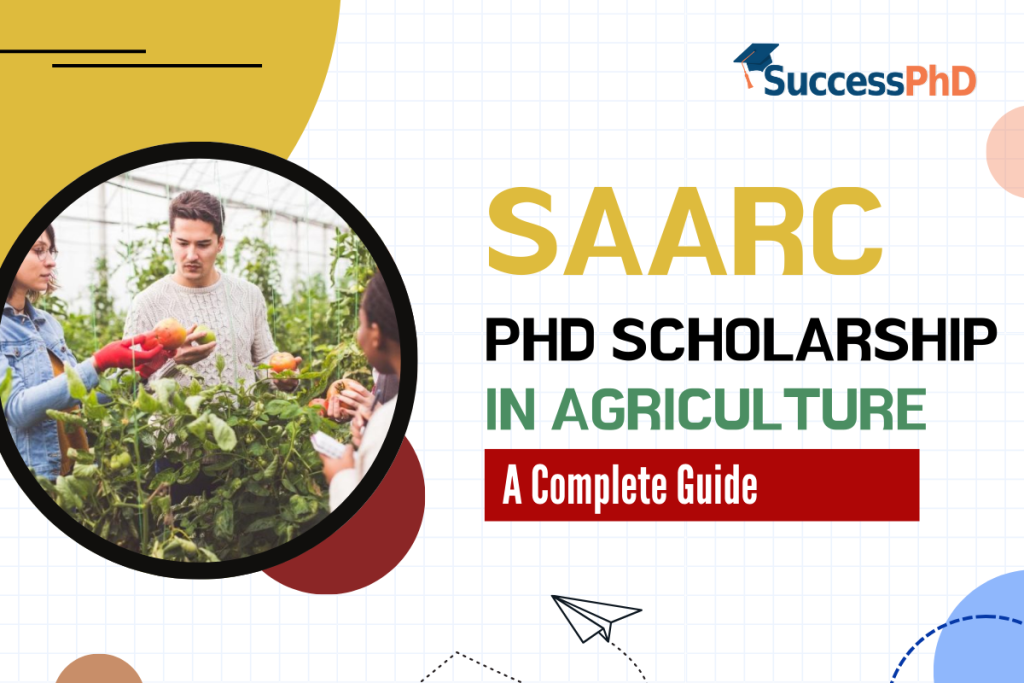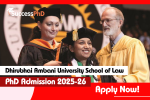How to Apply for the SAARC Agricultural PhD Scholarship: A Complete Guide
Are you looking to pursue a PhD in agriculture? The SAARC Agricultural Scholarship offers funding, mentorship, and regional impact for scholars committed to sustainable development.
- What is the SAARC Agricultural PhD Scholarship?
- Objectives of the Fellowship
- Eligibility Criteria & Financial Support
- How to Apply for the SAARC Agricultural PhD Scholarship
- Selection Process
- Importance of the SAARC Agricultural PhD Scholarship
- SAARC Agricultural PhD Scholarship FAQs
What is the SAARC Agricultural PhD Scholarship?
The SAARC Agricultural PhD Scholarship is a fully funded PhD scholarship administered by the SAARC Agriculture Centre (SAC) under the South Asian Association for Regional Cooperation. Through this unique regional initiative, agricultural professionals from SAARC member countries may not only pursue doctoral research in agriculture and allied subjects such as Animal Nutrition, Fish Nutrition & Feed Technology, Soil Science, Agricultural Economics, Molecular Biology and Biotechnology a full-time basis but also strengthen regional cooperation amongst agricultural professionals who are still in professional positions. SAARC Agricultural PhD Scholarship recipients are financially supported to conduct impactful research at institutions of high merit across South Asia (e.g., ICAR-IVRI, CIFE, Postgraduate Institute of Agriculture, University of Peradeniya).
Objectives of the Fellowship
- Develop research and development capacity in agriculture throughout South Asia by developing young professionals.
- Encourage regional cooperation in tackling agricultural problems common to SAARC member states.
- Facilitate applied and high-impact doctoral research that contributes to food security, sustainable practices and innovation in agriculture.
Eligibility Criteria & Financial Support
Eligibility Requirements
- Be a citizen of any of the SAARC countries (Afghanistan, Bangladesh, Bhutan, India, Maldives, Nepal, Pakistan, and Sri Lanka).
- Must be a regular staff member of a National Agricultural Research System (NARS), government ministry, or department.
- Age limit: 40 years old or younger at the time of application.
- Have a minimum of 3 years of professional service in agriculture or a related field.
- Strong command of English and willingness to pursue a full-time PhD for 3 years.
- Academic requirements: postgraduate degree (MSc or equivalent) in a relevant field such as Animal Nutrition, Fisheries Science, Agricultural Economics, Plant Breeding or Biotechnology.
Financial Support
- Air Transportation: A round-trip (economy class) airline ticket from the participant’s country to the host institute.
- Tuition: Full tuition coverage at host universities.
- Living allowance: US$600 per month for a period of three years.
- One-off grant: US$1,000 for books, thesis writing, and academic material.
- Research grant: US$1,000 for each of three years to support fieldwork, experiments, and other research expenses.
How to Apply for SAARC Agricultural PhD Scholarship
- Complete the official application form from the SAARC Agriculture Centre official website.
- Apply to your employer or the relevant Ministry (if applications are to be endorsed).
- If there is any chance of administrative delays for application submission, the submission of the application directly to SAC may be possible.
- Include all supporting documents, such as academic credentials, official proof of employment, and a brief synopsis of your research proposal.
Documents Required
- Postgraduate and undergraduate degree diplomas.
- Copies of your research publications (if any).
- Employer’s letter of recommendation and proof of employment.
- Passport/birth certificate (English version).
- A (synopsis) of the research that you want to propose (≤ 500 words) with objectives and expected outcomes.
Selection Process
Applications will be evaluated by a regional expert committee carefully, based on:
- Academic record and professional experience.
- Publications, awards, and professional recognition.
- Quality, clarity and innovation of the research proposal.
- Relevance and potential regional impact of the proposed doctoral research.
Importance of the SAARC Agricultural PhD Scholarship
This fellowship is instrumental in the development of a new generation of agricultural researchers to address food security, sustainability, and innovation in the region. It fosters cross-border collaboration among scholars from different SAARC countries who can offer regional collective solutions to shared challenges such as climate change, soil degradation, livestock nutrition, and agricultural economics.
Besides providing full financial support, the program enhances the fellows’ academic profile. The exposure and experience will contribute to their development as leaders in agricultural research and policy in South Asia.
SAARC Agricultural PhD Scholarship FAQs
Q: Which countries are eligible?
Ans: Citizens of all SAARC nations – Afghanistan, Bangladesh, Bhutan, India, Maldives, Nepal, Pakistan, and Sri Lanka.
Q: Is a part-time PhD allowed?
Ans: No, the scholarship is for a strictly full-time, 3-year doctoral degree.
Q: Where do fellows study?
Ans: The host institutions will depend on the research focus. i.e. ICAR-IVRI (India) for Animal Nutrition and CIFE (India) for Fish Nutrition and University of Peradeniya (Sri Lanka) for agricultural disciplines, etc.
Q: What if I am unable to complete the PhD?
Ans: The fellowship may cease, and the fellow may have to return funds or repay. There will also have to be a copy of the completed thesis submitted to SAC
Conclusion
The SAARC Agricultural PhD Scholarship not only provides a financial gift; it is also a regional capacity-building effort to bridge long-standing gaps in applied research in South Asia. By providing agricultural professionals the opportunity to undertake quality doctoral research, it builds a cadre of experts who are able to contribute to addressing important agricultural challenges in a way that contributes to longer-term sustainability in the region.
For professionals who want to contribute to the advancement of agriculture, this fellowship is both a defining moment for their career and a means of also making a difference regionally and globally.








Comments